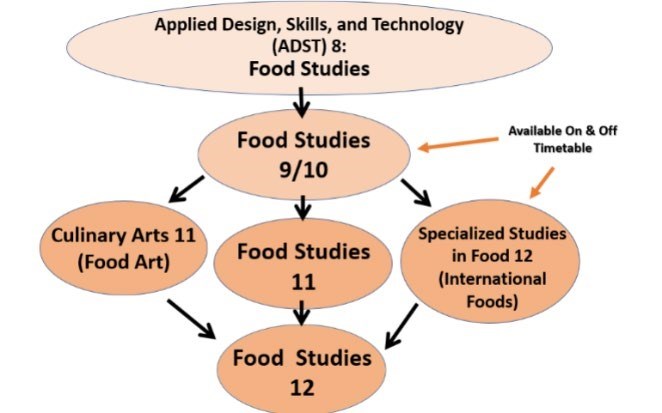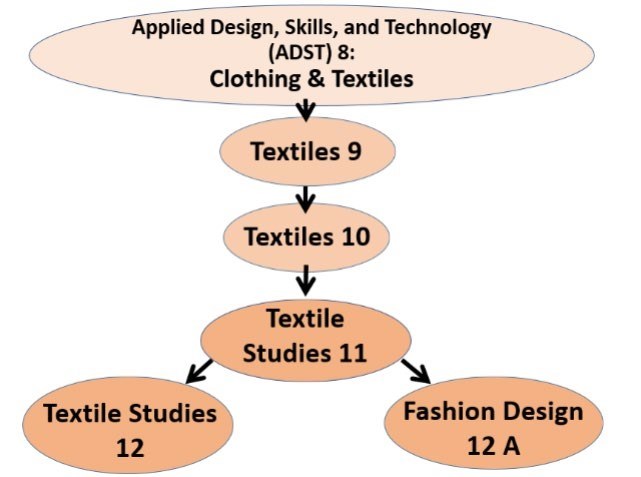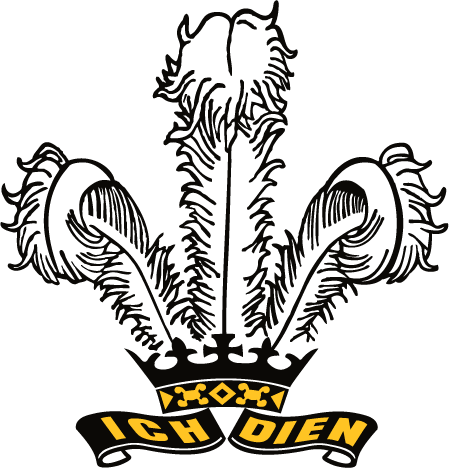Home Economics
 HOME ECONOMICS
HOME ECONOMICS
Home Economics courses meet the ADST requirement for graduation.
FOOD STUDIES
ADST 8 – Home Economics: see p. 12
Food Studies 9 & 10
Supplemental Materials/Equipment - $TBA
Foods Studies 9 & 10 serve as the beginning full year courses in food preparation. In these courses students will learn to plan and prepare nutritious, attractive, and delicious meals. The course covers food safety, nutrition, breakfasts, lunches, and dinners as well as baking, and pastries and fancy desserts. Learn to make cookies, cakes, pasta dishes, pizza, sushi and much more! Students wishing to prepare the food dishes demonstrated in class may opt to pay a personal consumption fee. Evaluation is based on student performance in the lab setting and on written assignments.
Food Studies 11
Recommended Prerequisite: Foods Studies 9, 10
Supplemental Materials/Equipment - $TBA
This course provides students with the knowledge and training in food preparation and nutrition as it applies to the individual, family and for a future career in the Culinary Arts. Practical projects will be used to investigate international cookery, yeast breads and special occasion foods. Students will learn through demonstrations, sampling, and individual research. Students wishing to prepare the food dishes demonstrated in class may opt to pay a personal consumption fee.
Evaluation is based on student organization, use of proper techniques, creativity, knowledge of the topic, final products and clean up. Written assignments will also be used to evaluate student efforts.
Food Studies 12
Recommended Prerequisite: Food Studies 11
Supplemental Materials/Equipment - $TBA
Students enrolled in this course will gain experience in advanced cooking and baking skills for entertaining at brunch, lunch, afternoon tea, and dinner. Students will choose many of their own recipes to prepare and illustrate new techniques. Gourmet foods, meal planning, and shopping for specialty foods will be a part of this course. Students wishing to prepare the food dishes demonstrated in class may opt to pay a personal consumption fee.
Evaluation is based on attitude, cooperation, ability to work independently, initiative and the products produced. Students keep a BLOG which can be used as a portfolio for culinary school.
Specialized Studies in Food 12
Recommended Prerequisite: Foods Studies 9/10
Supplemental Materials/Equipment - $TBA
In this course, students will travel around the world! Students will learn about the foods, customs, and celebrations of a variety of countries around the world.
A wide range of foods known and eaten in countries such as Canada, Mexico, France, Italy, India, China, Thailand, and Japan will be prepared, thereby allowing students to practice their culinary skills while developing an appreciation for the uniqueness of each country’s cuisine. Learn to make enchiladas, crepes, pasta, samosas, curries, sushi, pastries, and much more! Learn to work with unique food preparation equipment as well as unique foods. Discover how a country’s geography and history contribute to the development of its cuisine. Field trips to ethnic restaurants will enhance the global gourmet’s experience. Special topics such as food artistry and global issues will also be discussed. Students wishing to prepare the food dishes demonstrated in class may opt to pay a personal consumption fee.
Evaluation is based on student performance in the lab setting and theoretical knowledge in the form of recipes and assignments.
Culinary Arts 11 (Food Art 11)
Recommended Prerequisite: Foods Studies 9/10, Food Studies 11 or 12.
Supplemental Materials/Equipment - $TBA
This is a hands-on course where students will learn the elements and principles of design and apply them to food. Students will develop and apply skills in food preparation and emphasis will be placed on developing an appreciation for food presentation and food as an edible art form. Some of the edible works of art students will create include fancy pastries, yeast breads, food sculptures, garnishes, decorated cakes and cupcakes, candy making and many other projects.
This course also focuses on developing both team and independent work skills. Students throughout the course will create an online photo portfolio of their food creations which can be used for future studies and/or job interviews.
Additional Information:
Culinary Art 11 would allow students the opportunity to gain experience and credits in the areas of Fine Arts and Applied Skills within one course. This course gives students an opportunity to explore and be creative, develop an appreciation of food as an art form and to develop skills (both basic and more advanced). Students also have an opportunity to develop teamwork skills and at the same time this course allows for individual creativity and independent work.
Off-Timetable Food Studies! These courses are designed for students who would like to experience Foods in one afternoon per week! Be sure to register correctly!
Specialized Studies in Food 12: Off-Timetable on Tuesdays from 3:15pm to 6:00pm (yearlong)
Recommended Prerequisite: Food Studies 9/10
Supplemental Materials/Equipment - $TBA
In this course, students will travel around the world! Students will learn about the foods, customs, and celebrations of a variety of countries around the world. A wide range of foods known and eaten in countries such as Canada, Mexico, France, Italy, India, China, and Japan will be prepared, thereby allowing students to practice their culinary skills while developing an appreciation for the uniqueness of each country’s cuisine. Learn to make fajitas, crepes, fresh pasta, samosas, curries, sushi, pastries, and much more! Learn to work with unique food preparation equipment as well as unique foods. Discover how a country’s geography and history contribute to the development of its cuisine. Field trips to ethnic restaurants will enhance the global gourmet’s experience. Special topics such as food artistry and global issues will also be discussed.
Food Studies 9 & 10: Off-Timetable on Wednesdays from 3:15pm to 6:00pm (yearlong)
Supplemental Materials/Equipment - $TBA
Food Studies 9 and 10 serve as beginning courses in food preparation. In these courses students will learn to plan and prepare nutritious, attractive and delicious meals. The course covers food safety, nutrition, breakfasts, lunches and dinners as well as baking, pastries and fancy desserts. Learn to make and sample cookies, cakes, pasta dishes, pizza, sushi and more. Students wishing to prepare the food dishes demonstrated in class may opt to pay a personal consumption fee.
Evaluation is based on student performance in the lab setting and on written assignments.
 TEXTILES
TEXTILES
Textiles 9 & 10
Supplemental Materials/Equipment - $TBA
Have you ever wondered how to make a leather jacket, a sail for a wind surfer, or a Halloween costume? Would you like to make a quilt, sew a stuffed animal, or create interesting craft projects? Do you want a unique grad outfit and don't know how to design it? You will need to start off with an introductory course in clothing & textiles and by the time you finish the senior level courses, all your questions will be answered. If you are interested in fashion and creating your own clothing, then these are the courses for you! In Clothing and Textiles 9 & 10, students will learn the basics of using commercial patterns and will be introduced to the techniques necessary to sew fashionable clothes. They will begin with a simple craft project, then make Pajamas using a commercial pattern, and then progress to more complicated garments and techniques. Most students will complete at least 4 or 5 during the year. With enough interested students, there will be a Fashion Show in the spring.
Textile Studies 11
Recommended Prerequisite: Clothing & Textiles 10
Supplemental Materials/Equipment - $TBA
This is an intermediate level course in which students will have the opportunity to work with more advanced fabrics and create more challenging projects such as unlined jackets, skirts, party wear, and summer swimwear. Learning to use the serger and the computerized sewing machine will be helpful in handling more difficult fabrics. The number of garments varies from 4 to 8 depending on the students’ interests and skills.
Purchasing the fabrics, patterns, and notions for the major projects in the course are the student's responsibility and the cost will depend on the fabric and the garments that they choose.
Textile Studies 12
Prerequisite: Textile Studies 11
Supplemental Materials/Equipment - $TBA
This is an advanced course in sewing and tailoring techniques. Samples will be done that will provide students with the knowledge to create a tailored project. This project could be a lined jacket or coat. For the other projects, the student will also be encouraged to work with fabric such as velvets, sheers, silk, leather, suede, spandex knits, or slippery satins. Detailing such as piping, smocking, quilting, embroidering, and beading are also explored as a way of creating unique and distinctive garments. This is a great opportunity to make your Grad dress! Students are also involved in the planning and producing of the fashion show.
The supply fee includes all interfacing for tailoring, elastic, thread, use of the serger and the computerized embroidery machine, and the materials needed for mini projects. Purchasing the fabrics, patterns, and notions for major projects in the course are the student's responsibility.
Textiles Studies 12 satisfies both the Applied Skills 11 or Fine Arts 11 requirements.
BA Fashion Design 12A
This course can be taken in conjunction with Textile Studies 12 or on its own.
Supplemental Materials/Equipment - $TBA
Fashion Design students will cover advanced sewing techniques as well as pattern drafting and fashion illustration. Students will design a skirt from initial design sketches through pattern drafting and sloper to finished product. They will complete a portfolio of original fashion designs and be challenged to make patterns from them. Students will also examine fashion history for inspiration and collect a design reference collection. Design students will be a fundamental part of the Spring Fashion Show.

